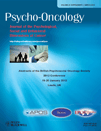
PSYCHO-ONCOLOGY
Scope & Guideline
Exploring Psychological Resilience in Cancer Care
Introduction
Aims and Scopes
- Psychosocial Support and Interventions:
Investigating the effectiveness of various psychosocial interventions aimed at improving the mental health and quality of life of cancer patients and their caregivers. - Caregiver Experiences:
Exploring the emotional and psychological challenges faced by caregivers of cancer patients, including their needs for support and resources. - Cognitive and Emotional Impacts of Cancer:
Studying the cognitive, emotional, and psychological effects of cancer diagnoses and treatments on patients, including issues related to anxiety, depression, and fear of recurrence. - Quality of Life and Survivorship:
Evaluating quality of life outcomes for cancer survivors, focusing on the long-term psychosocial impacts of cancer and the survivorship experience. - Health Disparities and Access to Care:
Addressing the disparities in cancer care and psychosocial support among different populations, particularly marginalized groups. - Digital Health and Technological Interventions:
Exploring the role of digital health technologies in providing psycho-oncological support, including telehealth and online interventions. - Cultural Competence in Cancer Care:
Understanding the cultural factors that influence cancer care experiences and the need for culturally sensitive interventions.
Trending and Emerging
- Telehealth and Remote Interventions:
The COVID-19 pandemic has accelerated the adoption of telehealth solutions, leading to increased research on the effectiveness and accessibility of remote psycho-oncological care. - Mindfulness and Acceptance-Based Therapies:
There is a growing focus on mindfulness-based interventions and acceptance and commitment therapy as effective strategies for managing psychological distress in cancer patients. - Intersectionality and Health Equity:
Research is increasingly addressing the intersectionality of race, gender, and socioeconomic status in cancer care, highlighting disparities and the need for inclusive practices. - Psycho-Oncology in Pediatric Populations:
Emerging interest in the unique psychosocial needs and interventions tailored for pediatric and adolescent cancer patients and their families. - Family Dynamics and Caregiver Support:
A trend toward understanding the role of family dynamics in coping with cancer, including the psychological impact on family members and the need for tailored caregiver support. - Digital Health Innovations:
Research on the use of digital health tools, such as mobile applications and online interventions, is expanding, focusing on their role in enhancing patient engagement and self-management.
Declining or Waning
- Traditional Psychotherapy Approaches:
There seems to be a decreasing emphasis on conventional psychotherapy models for cancer patients, as more innovative and integrative approaches, such as mindfulness and digital interventions, gain traction. - Focus on Physical Symptoms Alone:
Research concentrating solely on the physical symptoms of cancer without addressing the psychosocial context is becoming less common, reflecting a broader understanding of the biopsychosocial model. - Single-Disease Focus:
The trend of focusing exclusively on specific cancer types is waning, as there is a growing recognition of the need for holistic and comparative studies across various cancer types. - In-Person Support Groups:
The prevalence of in-person support groups appears to be declining as virtual support and online community-building initiatives become more popular, especially post-COVID-19.
Similar Journals
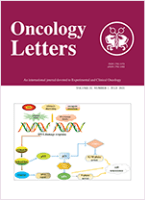
Oncology Letters
Elevating Oncology Discourse for Better Patient OutcomesOncology Letters is a prominent academic journal dedicated to disseminating high-quality research in the fields of oncology and cancer research. Published by SPANDIDOS PUBL LTD and based in Greece, this journal has established a significant presence since its inception in 2010 and continues to contribute to the scientific community with a focus on both clinical and experimental oncology. Notably, it holds a respectable Q3 ranking in the categories of Cancer Research and Oncology as of 2023, highlighting its relevance and contribution to these critical fields. With a Scopus rank of #139/404 in Medicine – Oncology and #117/230 in Biochemistry, Genetics, and Molecular Biology – Cancer Research, Oncology Letters serves as a valuable platform for researchers, professionals, and students alike to explore emerging findings and innovative treatment approaches. Though it operates within a traditional subscription model, this journal prides itself on fostering accessible and impactful discourse in oncology, making it an essential resource for those committed to advancing cancer research and improving patient care.
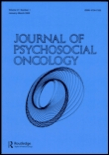
JOURNAL OF PSYCHOSOCIAL ONCOLOGY
Empowering patients with knowledge of psychosocial health.JOURNAL OF PSYCHOSOCIAL ONCOLOGY, published by Routledge Journals, Taylor & Francis Ltd, serves as a pivotal platform in the interdisciplinary field of psychosocial oncology, providing critical insights into the psychological, social, and emotional aspects impacting cancer patients and their families. With a storied history dating back to 1983 and converging until 2024, this journal holds a prestigious positioning, ranked in the Q2 category for Applied Psychology and Q3 for both Oncology and Psychiatry & Mental Health in 2023, highlighting its integral role in these overlapping fields. Despite not currently offering an open access model, the journal continues to attract a broad spectrum of scholars with its impactful research, evidenced by its Scopus rankings within the 50th to 58th percentile across related categories. Researchers, clinicians, and students alike will find the journal’s focus on the psychosocial dimensions of cancer to be invaluable, as it advances knowledge and practice aimed at improving patient outcomes and well-being in the cancer care continuum.

Psycho-Oncologie
Advancing Psychological Insights for Oncological Wellness.Psycho-Oncologie is a specialized academic journal dedicated to the intersection of psychology and oncology, published by TECH SCIENCE PRESS. With an ISSN of 1778-3798 and E-ISSN of 1778-381X, this journal serves as an important platform for researchers and practitioners seeking to understand the psychological impact of cancer on patients and their families. Established in 2007 and converging with its findings through 2024, Psycho-Oncologie aims to disseminate high-quality research that enhances mental health and promotes effective treatment strategies within the oncological landscape. Although currently holding a Q4 ranking in disciplines such as Clinical Psychology and Oncology, the journal is committed to maintaining a high standard of research integrity and scientific rigor to foster future advancements. Although it operates under a non-open access model, the journal strives to make its valuable insights available to a broader audience. For those in the fields of psychology, oncology, and health care, Psycho-Oncologie is an essential resource for staying abreast of critical developments and contributing to interdisciplinary approaches in cancer treatment.
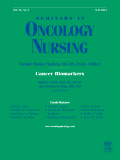
Seminars in Oncology Nursing
Fostering Excellence in Oncology Nursing Education and PracticeSeminars in Oncology Nursing, published by Elsevier Science Inc, serves as a cornerstone for the field of oncology nursing, facilitating the dissemination of high-quality research and clinical practice insights since 1985. This quarterly journal, with significant impact as reflected in its Q2 ranking in the Nursing category for Oncology, provides an essential platform for the authors to share their findings, experiences, and innovations that can enhance patient care in oncology settings. With its ISSN 0749-2081 and E-ISSN 1878-3449, the journal offers a comprehensive access to a wealth of articles that emphasize evidence-based practices, care models, and the evolving challenges faced by oncology nurses. Targeted towards researchers, clinicians, and students, Seminars in Oncology Nursing not only contributes to academic discourse but also supports the professional development of its readership, ultimately advancing the field of oncology nursing.

CANCER
Driving innovation in cancer treatment and biology.CANCER, published by Wiley, stands as a pivotal journal in the field of oncology and cancer research, boasting an impressive impact factor and consistently dynamic growth since its inception in 1948. With an ISSN of 0008-543X and an E-ISSN of 1097-0142, this esteemed journal is recognized for its rigorous peer-reviewed articles, making significant contributions to the understanding of cancer biology, treatment modalities, and clinical practices. CANCER holds a distinguished position in the academic community, securing its placement in the Q1 category for both cancer research and oncology, and ranks within the top percentiles on Scopus, indicating its high impact and relevance. The journal is particularly beneficial for researchers, professionals, and students seeking to stay abreast of the latest advancements in cancer science. By addressing essential research questions and providing pathways for new therapies, CANCER continues to play a crucial role in shaping the future of oncology and improving patient outcomes.
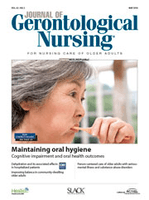
Journal of Gerontological Nursing
Innovating Nursing for a Greying WorldThe Journal of Gerontological Nursing, published by SLACK INC, is a leading peer-reviewed journal dedicated to advancing the field of gerontological nursing through innovative research, clinical practice, and educational advancements. Since its inception in 1975, this journal has become a crucial resource for researchers, healthcare professionals, and students interested in the care and management of older adults. With an impact factor that reflects its significance within the disciplines of gerontology and nursing (Category Quartiles: Q3 in Gerontology and Q3 in Nursing), it serves as a platform for disseminating vital findings, best practices, and evidence-based approaches aimed at improving the quality of life for the aging population. While the journal maintains a print-only format, its content is invaluable for those looking to stay ahead in the rapidly evolving landscape of gerontological care. As it continues to publish until 2024, the Journal of Gerontological Nursing invites contributions that foster dialogue and innovation within this essential area of healthcare.

BREAST CANCER RESEARCH AND TREATMENT
Exploring New Frontiers in OncologyBreast Cancer Research and Treatment, published by Springer, stands as a pivotal journal within the domains of Cancer Research and Oncology, exemplified by its impressive Q2 and Q1 quartile rankings, respectively, in the 2023 category rankings. Since its inception in 1981, this journal has provided a vital platform for disseminating cutting-edge research focused on all aspects of breast cancer, ranging from molecular biology to treatment strategies. With an ISSN of 0167-6806 and E-ISSN of 1573-7217, it captures a broad audience of researchers, clinicians, and students dedicated to improving patient outcomes. The journal emphasizes high-quality, peer-reviewed studies that pave the way for advancements in therapy and direct novel insights into oncological practices. By maintaining a strong ranking in Scopus with percentile placements of 74th in Oncology and 61st in Cancer Research, Brest Cancer Research and Treatment continues to foster innovation and collaboration in the fight against breast cancer.

International Journal of Cancer Management
Elevating the standards of cancer research and management.The International Journal of Cancer Management is a distinguished publication dedicated to advancing knowledge and research in the fields of cancer management, oncology, pharmacology, and radiology. Published by BRIEFLAND in the Netherlands, this journal serves as a vital resource for researchers, healthcare professionals, and students interested in the latest developments in cancer care and treatment strategies. With an ISSN of 2538-4422 and an E-ISSN of 2538-497X, the journal features a range of peer-reviewed articles that cover diverse aspects of cancer management, reflecting its commitment to high-quality, impactful research. The journal ranks in the Q4 category for Cancer Research and Oncology and Q3 for both Pharmacology and Surgery in 2023, signifying its growing influence in the scientific community. Through its open access format, the International Journal of Cancer Management ensures that critical research findings are accessible to all, promoting collaboration and innovation in the battle against cancer. Researchers looking to share their findings or learn more about current trends will find this journal an invaluable addition to their professional toolkit.

SUPPORTIVE CARE IN CANCER
Bridging research and practice for better patient outcomes.SUPPORTIVE CARE IN CANCER is a premier academic journal published by Springer, dedicated to advancing the understanding and management of supportive care for cancer patients. With a notable impact factor, the journal is recognized for its contribution to the fields of Oncology, Rehabilitation, and Nursing, achieving impressive rankings in Scopus, including Q1 for Oncology Nursing and Rehabilitation, and Q2 for general Oncology. Founded in 1993 and looking towards a promising future until 2024, it serves as a vital resource for researchers, professionals, and students engaged in these critical areas of healthcare. Although not an Open Access journal, its rigorous peer-reviewed articles provide valuable insights into innovative practices and evidence-based strategies that enhance patient quality of life during and after treatment. By bridging the gap between research and clinical practice, SUPPORTIVE CARE IN CANCER significantly influences patient outcomes and fosters interdisciplinary collaboration in patient support.
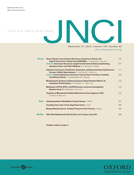
JNCI-Journal of the National Cancer Institute
Elevating the standards of cancer care through scholarly work.JNCI-Journal of the National Cancer Institute, published by Oxford University Press Inc. in the United Kingdom, is a premier journal dedicated to advancing the field of cancer research and oncology. With a distinguished history dating back to 1940, this journal has consistently maintained a strong reputation within the academic community, achieving a remarkable Q1 ranking in both Cancer Research and Oncology as of 2023. Researchers and practitioners rely on the JNCI for original research articles, review papers, and cutting-edge findings that impact clinical practices and therapeutic strategies. Although it does not currently offer open access, the journal remains a vital resource for academicians and healthcare professionals seeking to enhance their understanding of cancer mechanisms and treatment innovations. Its rigorous peer-review process ensures the publication of high-quality, credible research that meets the evolving challenges of cancer treatment and prevention through to 2024.